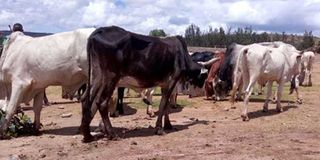Six Turkana herdmen shot dead by suspected bandits from S.Sudan

Cows at a market. Six Turkana herders were shot dead by suspected Toposa rustlers from South Sudan. PHOTO | FILE| NATION MEDIA GROUP
What you need to know:
Tension has gripped the area, with fear of possible attacks by the Toposa.
The areas hit by the renewed attacks are Mogila, Nanan, Nadapar and Kibish.
- Turkana North MP Christopher Nakuleu wants the government to establish military camps at hotspots.
Six Turkana herdsmen were killed by suspected South Sudan herders last weekend in renewed armed conflict over water and pasture.
The six were shot dead as they pursued more than 100 animals allegedly stolen by the Toposa from South Sudan.
Rift Valley regional coordinator Mongo Chimwaga on Wednesday confirmed the attack but was non-committal on the killings.
SECURITY PATROLS
The incident occurred at Muglia, on the Kenya-South Sudan border.
“Security patrols have been deployed along the common border to help recover the stolen animals and avoid retaliatory attacks,” added Mr Chimwaga by phone.
Nevertheless, tension has gripped the area, with fear of possible attacks by the Toposa.
Turkana North MP Christopher Nakuleu on Wednesday appealed to the government to establish military camps at hotspots along the border saying: "Our intelligence reports indicate that the Toposa militia have been mobilising around the Mogila Hills in readiness for an attack on our people.”
The areas hit by the renewed attacks are Mogila, Nanan, Nadapar and Kibish.
“We urge the Inter-Governmental Authority on Development and other peace agencies to support regular peace meetings to ease the mounting tensions,” said Mr Nakuleu, noting that retaliatory attacks impact negatively to both pastoral communities.
He attributed the recurrent attacks between the Turkana pastoralists and their counterparts from Ethiopia and South Sudan to the influx of illegal arms.
BLAME WEAPONS
Local leaders say the armed conflict between the pastoralist communities is fueled by the proliferation of weapons into the country, the spillover effects of the ongoing conflict in South Sudan.
They petitioned the government to put in place stringent measures along the porous Kenya-South Sudan border to check against intrusion by bandits and contain the upsurge in criminal activities.
Several hectares of grazing fields in Ethiopia have been put to agricultural use, forcing hundreds of Merille and Nyong’atom pastoralists to invade parts of Kibish Sub-county in search of pasture and water for their animals, triggering fresh conflict.
According to New York-based Human Rights watch group, about 100,000 hectares of land in the Lower Omo Valley have been earmarked for growing sugar cane and cotton, reducing pasture.
But the Ethiopian government says it is engaging the public in an agricultural revolution.
A senior government official in South Omo zone said several hectares of land are under massive crop production by irrigation that has resulted in scarcity of pasture to members of the pastoral communities.
The official disclosed that some Meriles have abandoned pastoralism and embrace agriculture which they consider to be more lucrative.
They grow such crops as maize, sorghum, millet, rice and fruits apart from commercial fishing activities in Lake Turkana.





